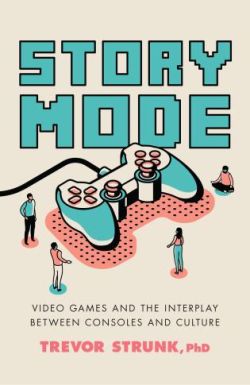 Trevor Strunk is the host of the No Cartridge podcast, though you might also know him as @Hegelbon on Twitter. As of today, he is also the author of Story Mode: Video Games and the Interplay Between Consoles and Culture, which was recently published by Prometheus Books.
Trevor Strunk is the host of the No Cartridge podcast, though you might also know him as @Hegelbon on Twitter. As of today, he is also the author of Story Mode: Video Games and the Interplay Between Consoles and Culture, which was recently published by Prometheus Books.
Story Mode looks to examine how several popular game franchises (such as Call of Duty) have changed over the years, as well as how those games have begun to rewrite our culture in their own way:
In Story Mode, video games critic and host of the No Cartridge podcast Trevor Strunk traces how some of the most popular and influential game series have changed over years and even decades of their continued existence and growth. We see how the Call of Duty games—once historical simulators that valorized conflicts like World War II—went “modern,” complete with endless conflicts, false flag murders of civilians, and hyperadvanced technology. It can be said that Fortnite’s runaway popularity hinges on a competition for finite resources in an era of horrific inequality. Strunk reveals how these shifts occurred as direct reflections of the culture in which games were produced, thus offering us a uniquely clear window into society’s evolving morals on a mass scale.
Story Mode asks the question, Why do video games have a uniquely powerful ability to impact culture? Strunk argues that the participatory nature of games themselves not only provides players with a sense of ownership of the narratives within, but also allows for the consumption of games to be a revelatory experience as the meaning of a game is oftentimes derived by the manner in which they are played.
An excerpt from Story Mode detailing the rise of id Software’s Doom and how it eventually gave way to “acceptable” violence in games (“How To Get Away With Making An Ultraviolent Video Game”) can be found at Defector.

